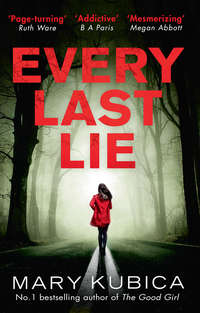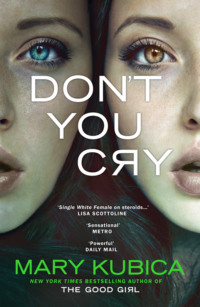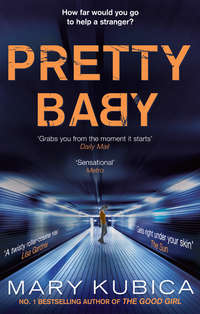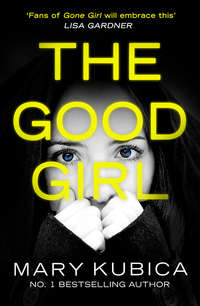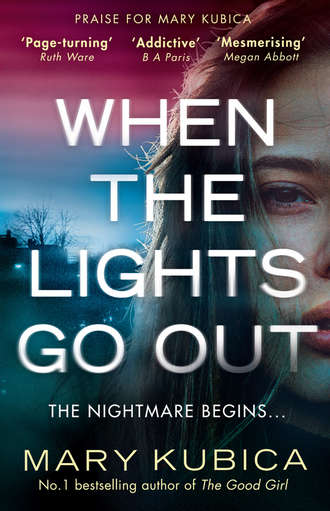
Полная версия
When The Lights Go Out: The addictive new thriller from the bestselling author of The Good Girl
Having no luck finding my social security card in the box of Mom’s paperwork, I started the day with an idea in mind: getting a new one. That and figuring out how to get my name removed from this inauspicious death index it’s on. I head toward the Social Security Office and there, wait in line for a mind-numbing hour, only to learn that in order to get a new social security card, I need to prove who I am. Something more legitimate than just my word. I need to provide some sort of official identifying documentation like a driver’s license or a birth certificate that says I’m Jessica Sloane, neither of which I have.
On the advice of an employee at the Social Security Office, I head next to the Cook County Clerk’s Office in the Richard J. Daley Center—the Bureau of Vital Records—in the hopes of tracking my birth certificate down.
When I arrive at the Daley Center, the plaza is teeming with people. I tie Old Faithful up to the bike rack outside, watching as men and women in business suits take wide strides across the plaza. I rush past the Picasso and into the imposing lobby, where I wait in line to pass through security, looking on as others empty their pockets with the speed of a snail. I make it through the X-ray machine and the contents of my bag are searched. When I’m deemed harmless, the guard sends me on my way to the clerk’s office, which is in the lower level of the building.
A surge of people wait before the elevator doors and so I take the stairs alone, heading down where I take my place in a long line, sighing in solidarity with those who also wait, avoiding eye contact, losing patience.
When it’s my turn, an employee beckons, “Next,” with a hand held up in the air so that I see her there, hunched over a computer screen, shoulders sagging. I go to her, telling her what I need.
Suddenly it dawns on me all the information I’m liable to find when the woman locates my birth certificate. Not only the documentation I need to prove I’m Jessica Sloane, but the place where I was born. The exact time I slipped from Mom’s womb. The name of the obstetrician who stood below, waiting to catch me as I fell.
My father’s name.
In just a few short minutes, I’ll know once and for all who he is. Not only will I have proof of my own identity, but of my father’s as well.
I would never have done something as flagrant as seek out my birth certificate from vital records if Mom were still alive. That would have broken her heart, my having access to all these things she never wanted me to have. Searching our home seemed innocent enough, but tracking down my birth certificate feels like a really egregious act were she still here.
But Mom told me to find myself, and that’s what I’m trying to do. To get into college, to make something of myself. To do something that would make Mom proud, all of which I can’t do without a social security card.
“I need to get a copy of my birth certificate,” I say to the employee. My heart quickens as she slides a request form across the counter. She tells me to fill it out. I reach for a pen, completing as much of the form as I can. It isn’t much. I can’t answer the question that pertains to place of birth or anything having to do with my dad—what his name is, where he was born.
It’s only as I pause in my writing that the worker takes pity on me. Her eyes soften ever so slightly and she says, “You don’t have to fill it all in,” while staring uncomfortably at the urn in the crook of my arm, seeing the way the pen in my hand hovers above the words father’s name. “Just as much as you know,” she adds, telling me she can try and look it up with what little I know. I slide the form back to her, half-complete, and she says she’ll just need the payment and to see a photo ID.
A photo ID.
It’s easy to explain why I don’t have a photo ID. Because by this point in most people’s lives, they have a driver’s license, which is something I also don’t have. Because the cancer came the year I turned fifteen, the year I was meant to enroll in my high school’s after-school drivers’ education program. Because after we learned that Mom had an invasive tumor in her left breast, knowing how to drive a car—in a city where we didn’t need or own a car—didn’t take top priority. Because my afternoons were tied up with Mom from then on, riding the bus with her to bajillions of doctor appointments or working to help pay for our home and her care. Because once I knew there was a good chance Mom would die, I wanted to spend every minute I could with her.
And yet I’m loath to tell the worker the bind I’m in because I know how it will sound. And so instead of coming clean, I root around in the pockets of my jeans, extracting the lining. I dive a hand deep into the depths of my bag searching for something I know isn’t there. I pluck thirty dollars out of my wallet—the cost of the birth certificate is only fifteen—and try handing it to the woman. “Keep the change, please,” I say, bemoaning in a low voice how my license was in my bag just this morning. How it must have fallen from my wallet on the way in. How it was there, but now it’s gone.
I press the urn to my chest, hoping the woman’s mercy will prevail and she’ll pocket the extra fifteen bucks and get me what I need. She stares at the money for a minute and then asks whether I have any other form of ID. An insurance card or voter registration, but I shake my head and tell her no. I don’t have either of these things. Mom had health insurance. A rock-bottom plan that helped pay for cancer treatment, though I’m still in the hole more than I care to think about. But Mom never added me to her insurance plan because she said it wasn’t something I needed. I was young and healthy and the rare trip to the clinic could be paid for with cash. Those required school vaccines I got at the Department of Public Health because they were cheap.
“Got any mail with your name on it?” the woman wants to know, but I shrug my shoulders and tell her no. She gives me a look. Disbelief, I think. I’m as much of a skeptic as the next guy; I know how this sounds.
“Please, ma’am,” I beg. I’m tired and I don’t know what else to do. My eyes feel heavy, threatening to close. There’s the greatest desire to lie down on the floor and sleep. Except that it’s only a tease, my body playing tricks on me. Even if I lie outstretched on the linoleum tiles, I still wouldn’t sleep.
“I really need that birth certificate, ma’am,” I say, shuffling in place, and it must be something about the way my voice cracks or the tears that well in my eyes that makes her lean forward and snatch the money from the countertop. She gathers the bills into her hand, counting them one at a time. Her eyes take a quick poll of the room to see if anyone else is watching, listening, before she whispers, “How about this. How about I see if I can find anything first. Then we’ll figure out what to do about the ID.”
I say okay.
She takes the form and begins typing information onto the rows of keys.
My heart pounds inside my chest. My hands sweat. In just a few short minutes, I’ll know who my father is. I start thinking about his name. Whether he’s still alive. And if he is, if he thinks about me the way I think about him.
By now, there are at least twenty people in line behind me. The room isn’t large by any means. It’s stodgy and drab, and everyone is looking at everyone else like they’re a common criminal. Ladies clutch their purses to their sides. A kid in line screams that he has to pee. As he yells, I glance over my shoulder to see this poor kid, maybe four years old, hand pressed to his groin, eyes wide and ready to burst, his mother reading him the riot act for nature’s call.
“There were no records found,” the woman says to me then. Not at all the words I expected to hear. My face falls flat; my mouth parts. For a second I’m confused, unable to produce coherent thoughts or words.
I fight to find my voice, asking, “Are you sure you spelled it correctly?” imagining her hunting and pecking for the letters, clipping the corner edge of some surplus letter by mistake, misspelling my name.
But her face remains motionless. She doesn’t attempt another search, as I’d hoped she’d do. She doesn’t glance down at the computer or check her work.
“I’m sure,” she says, raising a hand into the air to beckon for the next customer.
“But wait,” I say, stopping her. Not willing to give up just yet.
“There were no records found, miss,” she tells me again, and I ask, feeling incredulous, “What does that mean then, no records found?” because what I’m suddenly realizing is that, instead of being dead, the crux of the matter is that there is no birth record on file for me.
I can’t be dead because I haven’t yet been born.
The Bureau of Vital Records doesn’t even know I exist.
“Of course you must have found something,” I argue, not waiting for a reply. My voice elevates. “How can there be no birth certificate for me when clearly I’m alive?”
And then I pinch a fold of skin on my arm, watching as it swells and turns red before shriveling back down to size. I do it so that she and I can both see I’m alive.
“Ma’am,” she says, and there’s a shift in posture, her empathy quickly giving way to aggravation. I’ve become a pest. “You left half this form blank,” she says.
I argue that she told me I could. That she was the one who said I didn’t have to fill it all out. She ignores me, continues to speak. “Who’s to say you were even born in Illinois? Were you born in Illinois?” she asks, challenging me, calling my bluff, and I realize that I don’t know. I don’t know where I was born. All my life, I only assumed. Because Mom never told me otherwise and I never thought to ask.
“No records found means that I couldn’t locate a birth certificate based on the information you gave me. You want to find your birth certificate, you need to fill in the rest of these blanks,” she tells me, slipping the request form back to me as I stare down helplessly at all the missing information, name of father, place of birth, wondering if what I filled in was even correct to begin with.
Was Mom always a Sloane like me? That I’d also assumed. But if she was married when I was born, then maybe she had a different last name, one she ditched at some point over the last twenty years for some reason I don’t know?
“And next time,” the employee tacks on as I back dismally away, losing hope, running blindly into another woman in line, “be sure and bring your ID.”
I make my way out the door, climbing back up to the first floor two steps at a time. The building’s stairwell is industrial and dark, a flash of gray that comes at me quickly. It spirals upward in circles for thirty floors or more. When I arrive on the first floor, slipping through the stairwell door, crowds flood the lobby of the Daley Center. I’m grateful for this, for the anonymity of it all. I camouflage myself among the wayward teens who’ve been summoned here for court, those with purple-dyed hair and heads hidden beneath sweatshirt hoods. I make my way back outside, nowhere closer to finding my father or proving my identity.
As far as the world is concerned, I’m still dead.
eden
September 14, 1996 Egg Harbor
The town was mobbed with people today as it always is on Saturdays, vacationers trying hard to take advantage of the last few warm days before fall arrives. It’s September now, days shy of the equinox, and as September eventually bleeds into October, the seas of people will finally leave. They come for the hundreds of miles of shorelines, the extensive gift shops, the food. But by December, this far north into Wisconsin, the temperatures will hurtle to twenty or thirty degrees, mounds of snow will obstruct the streets, and the skies will be endlessly gray. And then no one will want to be here, least of all me. Aaron and I will spend the Midwest winter as we always do, imagining the warm places in the world we hope to one day go, places where cold and snow don’t exist. St. Lucia, Fiji, Belize.
Places we will never go.
I spent the day while Aaron was at work wandering the town’s streets, simulating a tourist. I visited gift shops; I bought a T-shirt and ice cream, a book on sailing. I rode the Washington Island Ferry through Death’s Door, spending the late-afternoon hours exploring the crystal clear waters and the polished white stones of Schoolhouse Beach, trying to skip rocks out over the lake, and like getting pregnant, failing at that too.
Back in town I watched families wander from store to store, mothers with buggies, fathers with toddlers perched on their backs. I stared at them as afternoon blended into evening, seated on a bench at Beach View Park, watching as families laid out blankets, staking their claim to a patch of land for the night’s sunset display.
The children were everywhere, and I started to wonder why something in so much abundance could ever be hard to achieve.
October 8, 1996 Egg Harbor
Each time Miranda and her boys stop by, she has a new suggestion for me, some tip on how to hasten conception. No subject is too personal or too taboo to discuss, from the style of Aaron’s underwear to various positions that supposedly aid in fertilization as she lounges on my back patio or living room sofa, weather depending, and cites for me the reasons she believes Aaron and I are not yet pregnant—though never once did I ask.
As she talks, Jack and Paul loiter before us, performing for me a song they learned, a magic trick, how they can make their eyes go crossed. They stand before me as Miranda spells out the effects of tight underpants on the male genitalia, saying over and over again, “Look at me, Miss Eden. Look what I can do,” while folding their tongues in half, or trying to make them stretch clear to the ends of their noses, and, as Miranda talks louder to counter their escalating tones, it hits me how attention-starved they are, how they would give anything for her to watch them for a minute, to praise their talents. Every day, there is dirt wedged beneath their nails and some sort of food on their cheeks and chins. Their outfits are cobbled together with clothing that doesn’t match and hardly fits.
I clap my hands for Jack and Paul, but Miranda tells them to go away. To go play.
Every day.
As her baby bump swells more and more, I’m pestered by Miranda to hurry up, to get knocked up, so that her baby and my baby can still go to school together as I’ve promised her they would.
If I wait much longer they’ll be in different grades.
That’s what Miranda has told me.
“September is the cutoff, don’t you know?”
According to Miranda’s timeline, I have until September of next year to have a baby. Twelve months, which leaves only three to get pregnant.
“It’s not that we’re not trying,” I’ve tried to explain, and she counters with a flip of the hand and a slapdash “I know, I know,” and then it’s back to the underwear we go. To help with Aaron’s and my fertility issues, she suggested a pillow beneath my hips to help steer sperm in the right direction. “It’s all about gravity,” she says.
At every visit I watch the size of her own baby bump swell, her maternity shirts no longer able to cover its overwhelming girth. I tell myself that her suggestions are only old wives’ tales, not rooted in truth, but how am I to know if that’s true?
But today when she lounged on my sofa, peering at me with that same expression on her face—mouth parted, eyebrows raised—and asked if I was keeping track of my ovulation, I realized how stupid it was of me, how naive.
This was Aaron’s and my first foray into babymaking. I was sure it was something that just happened, that there was no need to time or plan. In the moment, I told her yes, of course I was keeping track of my dates, because I couldn’t bring myself to say otherwise, to admit to her that it never occurred to me to figure out when I was and when I wasn’t ovulating. Aaron and I both come from large families, and the number of grandchildren our parents have been blessed with is in no way in short supply. It seemed a given that after ample time, after many months of waking up in the morning to Aaron’s soft fingers tracing my bare skin, thumbs hooking through the lacy edges of my underpants, gliding them proficiently over my thighs, sooner or later we’d succeed. We’d make a baby as we intended to do.
But for the first time I’ve come to realize that this is going to take more than time.
After Miranda left I drove to the library and sought out a guidebook on pregnancy and there, in the stacks of books, plotted out my approximate menstrual cycle. I figured out the first date of my last period. I counted backward; I did the math. It wouldn’t be perfect, that I knew—my periods had never been perfect—but it would be close. And close to perfect was better than nothing for me.
And now, knowing that in just two days’ time I will be ovulating fills me with an abundant amount of hope. Aaron and I were doing it wrong all along, missing out on the best times to get pregnant, likely omitting my most fertile days, those negligible hours when conception can occur. On the way home I stopped at the market and picked up a pocket-size calendar and, at home, with a red pen, circled my most fertile days for the next three months, through the end of the year.
This time we’ll get it right.
jessie
I push my way through the turnstile doors and step outside, making my way across the plaza. Beside the Eternal Flame, I pause, overcome with the sudden urge to scale the fence and lie down beside the puny little fire in the fetal position. To fall to my side on the cold concrete, beside the memorial for fallen soldiers. To pull my knees up to my chest in the middle of all those pigeons who huddle around it, trying to keep warm. The land around the flame is thick with birds, the concrete white from their waste. That’s where I want to lie. Because I’m so tired I can no longer stand upright.
People breeze past me. No one bothers to look. A passing shoulder slams into mine. The man never apologizes and I wonder, Can he see me? Am I here?
I head to the bike rack, finding Old Faithful ensnared beneath the pedals and handlebars of a dozen or more poorly placed bikes. I have to tug with all my might to get her out and still I can’t do it. The frustration over my identity boils inside me until I feel myself begin to lose it. All this red tape preventing me from getting what I need, from proving who I am. I’m starting to question it myself. Am I still me?
The debilitating effects of insomnia return to me then, suddenly and without warning. General aches and pains plague every muscle in my body because I can’t sleep. Because I haven’t been sleeping. My feet hurt. My legs threaten to give. I shift my weight from one leg to the next, needing to sit. It’s all I can think about for the next few seconds.
Sitting down.
Pins and needles stab my legs. I wrench on the bike, yanking as hard as I can, but still she doesn’t budge. “Need a hand?” I hear, and though clearly I need a hand, there’s a part of me feeling so suddenly indignant that I turn with every intent of telling the person that I’ve got it. Words clipped. Expression flat.
But when I turn, I see a pair of blue eyes staring back at me. Royal blue eyes like the big round gum balls that drop down the chute of a gum-ball machine. And my words get lost inside my throat somewhere as I rub at my bleary eyes to be sure I’m seeing what I think I’m seeing. Because I know these eyes. Because I’ve seen these eyes before.
“It’s you,” I say, the surprise in my voice clear-cut.
“It’s me,” he says. And then he reaches over and hoists Old Faithful inches above the other bikes, those that have held her prisoner all this time. It’s effortless to him, like nothing.
He looks different than the last time I saw him. Because the last time I saw him he was folded over the cafeteria table, drinking coffee in a sweatshirt and jeans. Now he’s dressed to the nines in black slacks, a dress shirt and tie, and I know what it means. It means that his brother has died. His brother, who was hurt in a motorcycle accident after a car cut him off and he went flying off the bike, soaring headfirst through the air and into a utility pole without a helmet to protect his head.
He held vigil beside his brother’s hospital bed while I held vigil beside Mom’s. And now, six days later, his eyes still look tired and sad. When he smiles, it’s strained and unconvincing. He’s gotten a haircut. The dark, messy hair has been given a trim and though it’s not prim or tidy—not by a long shot—it looks clean. Combed back. Much different than the hair I saw those days and nights in the hospital cafeteria, his head stuffed under the hood of a red sweatshirt. We only spoke the one night, him fussing about the coffee, telling me how he’d rather be anywhere but there. But still, there’s the innate sense that I know him. That we shared something intimate. Something much more personal than coffee. That we’re bound by a similar sense of loss, united by grief. Both collateral damage in his brother’s and my mother’s demise.
He sets Old Faithful down on the ground and passes the handlebar to me. I take her in my hand, seeing the way his nails are bitten to the quick, the skin torn along the edges. A row of rubber bands rests on his wrist, the last one tucked halfway beneath the cuff of the dress shirt. A single word is written on the back of the hand with blue ink. I can’t read what it is.
He runs his hands through his hair and only then do I think what I must look like.
It can’t be good.
“What are you doing here?” I ask, as if I have any more right being here than him.
He speaks in incomplete sentences, and still I get the gist. “The wake,” he says. “St. Peter’s. I needed some air.”
He points in the direction of some church just a couple of blocks from here, one that’s too far to see from where we stand. Though still I look, seeing that the sun has slipped from the sky and is hidden now behind a cloud. While I was inside the building, the clouds rolled into the city, one by one. They changed the morning’s blue sky to one that is plush and white, filling the sky like cotton balls, making the day ambiguous and gray.
I don’t ask when or how his brother died and he doesn’t ask about Mom. He doesn’t need to because he knows. He can see it in my eyes that she has died. Neither of us offer our condolences.
He rams his hands into the pockets of his slacks. “You never told me your name,” he says. If I was the kind of girl that felt comfortable in situations like these, I’d say something snarky like Well, you never asked.
But I don’t because it’s not that type of conversation, and I’m not that girl.
“Jessie,” I say, sticking my hand out by means of introduction. His handshake is firm, his hand warm as he presses it to mine.
“Liam,” he says, eyes straying, and I take it as my cue to leave. Because there isn’t anything more to say. The one and only conversation we had in the hospital, words were sparse, but unlike in the hospital we’re no longer killing time, just waiting for people to die. That night, before the conversation drifted to quiet and we sat in silence for over an hour, sipping our coffees, we talked about private things, nonpublic things, things we weren’t apt to tell the rest of the world. He told me about his brother beating him up when they were kids. About how he would lock him out of the house in the rain and shove his head in the toilet, giving him a swirly when their folks weren’t home. Such a bastard, he said, though I got the sense that that was then and this was now. That over the years, things changed. But he didn’t say when or how.
I told him about Mom’s hair and fingernails, both of which she lost thanks to chemotherapy. Her eyelashes too. I told him about the clumps of hair that fell out, and how I watched on in horror as Mom held fistfuls of it in her hands. How there were whole clods of it on her pillowcase when she awoke in the morning, masses of it filling the shower drain. I said that Mom never cried, that only I cried. It grew back, after the cancer was in remission for the first time, soft fuzz that grew a little thicker than it was before chemotherapy. A little more brown. It never reached her shoulders before the cancer returned.


